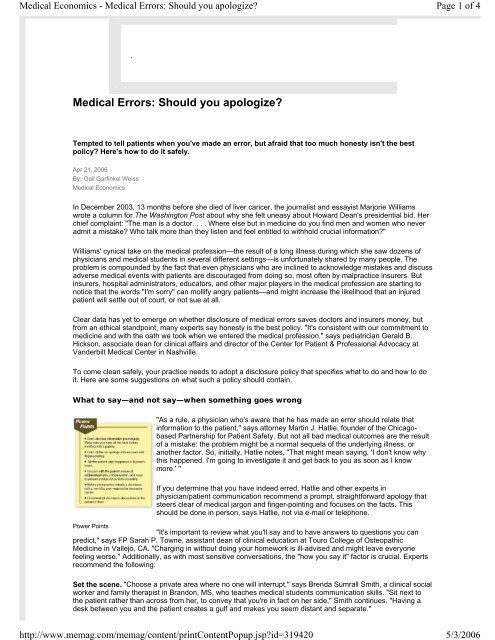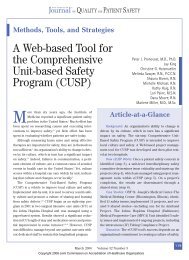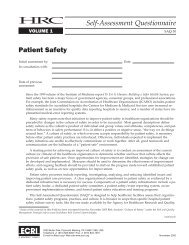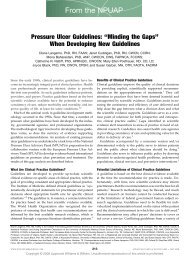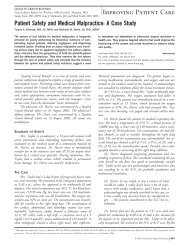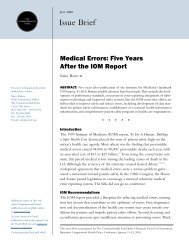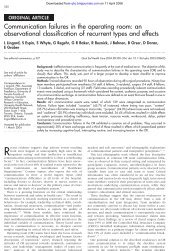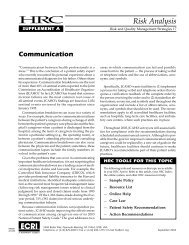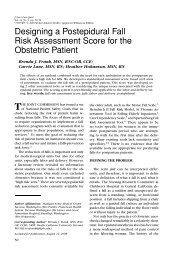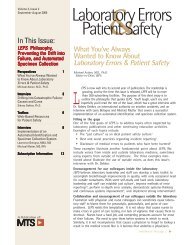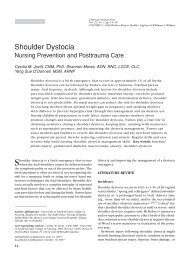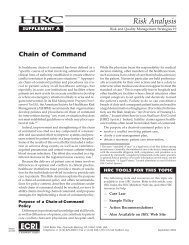Medical Errors: Should you apologize? - MCIC Vermont Patient ...
Medical Errors: Should you apologize? - MCIC Vermont Patient ...
Medical Errors: Should you apologize? - MCIC Vermont Patient ...
You also want an ePaper? Increase the reach of your titles
YUMPU automatically turns print PDFs into web optimized ePapers that Google loves.
<strong>Medical</strong> Economics - <strong>Medical</strong> <strong>Errors</strong>: <strong>Should</strong> <strong>you</strong> <strong>apologize</strong>?<br />
http://www.memag.com/memag/content/printContentPopup.jsp?id=319420<br />
Page 1 of 4<br />
5/3/2006<br />
<strong>Medical</strong> <strong>Errors</strong>: <strong>Should</strong> <strong>you</strong> <strong>apologize</strong>?<br />
Tempted to tell patients when <strong>you</strong>'ve made an error, but afraid that too much honesty isn't the best<br />
policy? Here's how to do it safely.<br />
Apr 21, 2006<br />
By: Gail Garfinkel Weiss<br />
<strong>Medical</strong> Economics<br />
In December 2003, 13 months before she died of liver cancer, the journalist and essayist Marjorie Williams<br />
wrote a column for The Washington Post about why she felt uneasy about Howard Dean's presidential bid. Her<br />
chief complaint: "The man is a doctor. . . . Where else but in medicine do <strong>you</strong> find men and women who never<br />
admit a mistake? Who talk more than they listen and feel entitled to withhold crucial information?"<br />
Williams' cynical take on the medical profession—the result of a long illness during which she saw dozens of<br />
physicians and medical students in several different settings—is unfortunately shared by many people. The<br />
problem is compounded by the fact that even physicians who are inclined to acknowledge mistakes and discuss<br />
adverse medical events with patients are discouraged from doing so, most often by malpractice insurers. But<br />
insurers, hospital administrators, educators, and other major players in the medical profession are starting to<br />
notice that the words "I'm sorry" can mollify angry patients—and might increase the likelihood that an injured<br />
patient will settle out of court, or not sue at all.<br />
Clear data has yet to emerge on whether disclosure of medical errors saves doctors and insurers money, but<br />
from an ethical standpoint, many experts say honesty is the best policy. "It's consistent with our commitment to<br />
medicine and with the oath we took when we entered the medical profession," says pediatrician Gerald B.<br />
Hickson, associate dean for clinical affairs and director of the Center for <strong>Patient</strong> & Professional Advocacy at<br />
Vanderbilt <strong>Medical</strong> Center in Nashville.<br />
To come clean safely, <strong>you</strong>r practice needs to adopt a disclosure policy that specifies what to do and how to do<br />
it. Here are some suggestions on what such a policy should contain.<br />
What to say—and not say—when something goes wrong<br />
"As a rule, a physician who's aware that he has made an error should relate that<br />
information to the patient," says attorney Martin J. Hatlie, founder of the Chicagobased<br />
Partnership for <strong>Patient</strong> Safety. But not all bad medical outcomes are the result<br />
of a mistake: the problem might be a normal sequela of the underlying illness, or<br />
another factor. So, initially, Hatlie notes, "That might mean saying, 'I don't know why<br />
this happened. I'm going to investigate it and get back to <strong>you</strong> as soon as I know<br />
more.' "<br />
If <strong>you</strong> determine that <strong>you</strong> have indeed erred, Hatlie and other experts in<br />
physician/patient communication recommend a prompt, straightforward apology that<br />
steers clear of medical jargon and finger-pointing and focuses on the facts. This<br />
should be done in person, says Hatlie, not via e-mail or telephone.<br />
Power Points<br />
"It's important to review what <strong>you</strong>'ll say and to have answers to questions <strong>you</strong> can<br />
predict," says FP Sarah P. Towne, assistant dean of clinical education at Touro College of Osteopathic<br />
Medicine in Vallejo, CA. "Charging in without doing <strong>you</strong>r homework is ill-advised and might leave everyone<br />
feeling worse." Additionally, as with most sensitive conversations, the "how <strong>you</strong> say it" factor is crucial. Experts<br />
recommend the following:<br />
Set the scene. "Choose a private area where no one will interrupt," says Brenda Sumrall Smith, a clinical social<br />
worker and family therapist in Brandon, MS, who teaches medical students communication skills. "Sit next to<br />
the patient rather than across from her, to convey that <strong>you</strong>'re in fact on her side," Smith continues. "Having a<br />
desk between <strong>you</strong> and the patient creates a gulf and makes <strong>you</strong> seem distant and separate."
<strong>Medical</strong> Economics - <strong>Medical</strong> <strong>Errors</strong>: <strong>Should</strong> <strong>you</strong> <strong>apologize</strong>?<br />
http://www.memag.com/memag/content/printContentPopup.jsp?id=319420<br />
Page 2 of 4<br />
5/3/2006<br />
Reach out and touch. You can say <strong>you</strong>'re sorry and that <strong>you</strong> regret what happened, but nothing conveys<br />
caring as much as gently touching the patient's hand, says Smith. "Don't pat someone on the back, head, or<br />
shoulder; that's sometimes seen as condescending. Stay between the elbow and the fingertips."<br />
Watch <strong>you</strong>r body language. Assume an open body posture, Smith advises. Don't cross <strong>you</strong>r legs. Let <strong>you</strong>r<br />
arms rest at <strong>you</strong>r side. Keep <strong>you</strong>r hands open. That telegraphs to patients that <strong>you</strong>'re being honest with them.<br />
Give the patient some control. Allowing people to make choices, even small ones, reduces their hostility. If<br />
<strong>you</strong>'re going to tell a patient <strong>you</strong>'ve made an error, Smith suggests the following language: "I'd like to talk about<br />
some things that have happened with <strong>you</strong>r care. When can <strong>you</strong> come in?"<br />
Resist the urge to make excuses. "An apology should never include the word but," says Gerald Hickson, who<br />
teaches a course in disclosure at Vanderbilt. "You dilute the value of an apology if, for example, <strong>you</strong> say, 'I'm so<br />
sorry I prescribed the wrong medication for <strong>you</strong>, but I'd been seeing patients for 10 hours without a break and I<br />
was exhausted when I wrote that prescription.' "<br />
Don't deflect the apology. A patient who has been harmed wants to know that <strong>you</strong> care about what happened<br />
to him, not that <strong>you</strong>'re looking for ways to absolve <strong>you</strong>rself of responsibility by pointing a finger at <strong>you</strong>r nurse or<br />
another healthcare professional.<br />
Smith recommends having others in the room. "Not a lawyer; but perhaps a family member of the patient and a<br />
nurse. The latter can help the patient, while at the same time serving as a witness to what was said."<br />
Won't apologizing open a can of worms?<br />
Although most physicians acknowledge that the push toward disclosing medical errors is admirable, some<br />
question the wisdom—or even the necessity—of stoking fires that are best left alone or of providing attorneys<br />
with ammunition. Charles Davant, an FP in Blowing Rock, NC, says that he routinely acknowledges mistakes<br />
when they're unlikely to result in legal action—e.g., "The lab lost <strong>you</strong>r specimen; thank goodness <strong>you</strong>'re getting<br />
better anyway." But, he adds, "handing someone a gun and asking him to shoot <strong>you</strong> is a different thing<br />
altogether. There's a good chance an adverse outcome might not tempt a hungry attorney if he's not sure what<br />
went wrong. Why spell it out for him?"<br />
An FP in Washington State learned this the hard way when he failed to notice, until a follow-up visit, that a<br />
patient's PSA was elevated. "I referred him to a urologist, who successfully treated him for prostate cancer,"<br />
says the FP, who requested anonymity. "The delay in diagnosis had no negative effect, but I told the patient<br />
because I felt he had a right to know. He responded by suing me. In retrospect, I still feel that I did the right<br />
thing. It would have been nice if the patient had done the right thing, too, but he didn't."<br />
Nonetheless, Brenda Sumrall Smith maintains that a good disclosure policy can stave off lawsuits. "Sometimes,<br />
especially if an injury isn't debilitating, all a patient or family wants is for the truth to be told, and some<br />
assurance that remedial action has been taken—possibly that <strong>you</strong>r office has implemented a more efficient way<br />
of handling phone calls or tracking lab work."<br />
Disclosure is rarely a one-shot event<br />
Disclosure is usually characterized by multiple meetings and telephone conversations with the patient, says<br />
attorney Martin Hatlie. During the initial meeting, explain that <strong>you</strong>'re open to questions and further discussions.<br />
You can say, "I know this was unexpected and upsetting news. If <strong>you</strong> think of other questions, I'd be happy to<br />
meet with <strong>you</strong> again or talk with <strong>you</strong> on the telephone. Here's the number where <strong>you</strong> can reach me."<br />
If a patient has been injured, <strong>you</strong> need to determine how communication and additional care—and the costs of<br />
that care—will be managed before <strong>you</strong> talk to the patient. "Steer clear of sweeping statements, such as 'Don't<br />
worry, the expenses will be taken care of,' unless <strong>you</strong>'re going to handle all associated care and intend to waive<br />
<strong>you</strong>r fee," says Gerald Hickson. "But if, say, the patient needs surgery or other expensive corrective treatment,<br />
don't make promises or put anything in writing. Call in <strong>you</strong>r attorney, <strong>you</strong>r insurance company's risk manager,<br />
and other professionals who were involved in the patient's care—then bring the patient into the loop."<br />
As with every physician-patient interaction, all disclosure discussions should be documented. "The note need<br />
not be a verbatim transcript," says Richard P. Kidwell, director of risk management at the University of<br />
Pittsburgh <strong>Medical</strong> Center, "but it should contain the identity of the attendees and the issues discussed,<br />
including apologies, explanations, and assurances. Each entry should be dated, timed, legible, and factual."<br />
The legal pitfalls of 'fessing up<br />
Malpractice insurers, in general, aren't big fans of disclosure policies. Some might say outright that <strong>you</strong>'ll
<strong>Medical</strong> Economics - <strong>Medical</strong> <strong>Errors</strong>: <strong>Should</strong> <strong>you</strong> <strong>apologize</strong>?<br />
http://www.memag.com/memag/content/printContentPopup.jsp?id=319420<br />
Page 3 of 4<br />
5/3/2006<br />
jeopardize <strong>you</strong>r coverage if <strong>you</strong> admit to harming a patient; others are okay with statements in which <strong>you</strong><br />
indicate <strong>you</strong>'re sorry without also indicating <strong>you</strong>'re responsible.<br />
A few liability insurance companies, though, encourage physicians to report errors to patients. Colorado's<br />
COPIC, for example, is notable for its 3Rs Program, which was launched in October 2000 with the aim of<br />
getting doctors to recognize, respond to, and resolve patient-injury situations. "The 3Rs model fosters<br />
communication in an attempt to maintain the physician/patient relationship," says Richert Quinn, the program's<br />
medical director. <strong>Patient</strong>s are offered some reimbursement—up to $25,000 for out-of-pocket expenses not<br />
covered by their health insurance, and up to another $5,000 for loss of income on a per-diem basis of $100.<br />
However, patients who accept payments from the program don't waive their right to sue. More than 2,500 out of<br />
some 6,000 COPIC-insured physicians are enrolled in the 3Rs Program, which earns them points toward<br />
premium discounts.<br />
A key reason that COPIC physicians are able to be so frank with patients is that the Colorado legislature has<br />
passed what Quinn calls "a strong 'I'm sorry' statute," which specifies that statements of concern, regret, and<br />
even acknowledgement of fault aren't admissible against a physician in a subsequent lawsuit. But most states<br />
don't provide protective umbrellas for doctors who express regret for a medical error, and acknowledgement of<br />
fault is admissible in legal proceedings. In Kidwell's view, even if <strong>you</strong> live in one of those states, <strong>you</strong> should still<br />
<strong>apologize</strong>—and admit responsibility—when <strong>you</strong>'ve harmed a patient. "If the patient sues, try to settle the claim<br />
early on," Kidwell says. "If settlement efforts falter—because, say, the plaintiff's attorney is demanding an<br />
unreasonable amount of money—and <strong>you</strong> wind up in court, the jury will appreciate the fact that <strong>you</strong>'ve accepted<br />
responsibility and want to see the patient compensated."<br />
Or <strong>you</strong> can disclose a mistake in the presence of a mediator. <strong>Patient</strong>s who agree to mediation can't be asked to<br />
forfeit the right to sue, but any information presented at mediation—including an acknowledgement of error or<br />
an apology—can't be used outside the mediation. Hatlie suggests that <strong>you</strong> start by telling the patient, "We have<br />
some information about <strong>you</strong>r medical care we'd like to give <strong>you</strong>, but we want to do it in a neutral setting with a<br />
mediator present." Provide the requisite facts about how the mediation content can and can't be used in other<br />
settings, and if the patient concurs, put the agreement in writing.<br />
Unlike arbitration, mediation is nonbinding; a resolution is enforceable only if both sides agree to it. The<br />
American Arbitration Association (www.adr.org) or the alternative dispute resolution section of <strong>you</strong>r local bar<br />
association can provide <strong>you</strong> with a list of qualified professional mediators.<br />
Whether <strong>you</strong> go the mediation route or have a series of conversations with the patient, disclosure coupled with<br />
apology offers <strong>you</strong> an opportunity to work things out and build trust with the patient and family. "If <strong>you</strong> make a<br />
mistake," says Kidwell, "don't compound it by attempting to sweep it under the rug. Get it out in the open, deal<br />
with it, and try to get past it."<br />
Putting it in writing<br />
Add <strong>you</strong>r disclosure policy to <strong>you</strong>r practice's policy and procedures manual, and make sure that all clinical and<br />
clerical employees get a copy, says Richard P. Kidwell, director of risk management at the University of<br />
Pittsburgh <strong>Medical</strong> Center. In addition to specifying which errors should be disclosed to the patient or patient's<br />
surrogate, the policy should address:<br />
• Notification of <strong>you</strong>r liability insurer prior to each disclosure.<br />
• Designation of who should disclose.<br />
• Identification of who, other than the patient, should be present during the disclosure.<br />
• The components of the disclosure. Depending on what <strong>you</strong>r malpractice carrier allows, these may<br />
include a statement that an error occurred, an apology, information regarding treatment options, an<br />
opportunity for the patient to ask questions, and identification of follow-up procedures.<br />
"Don't make promises <strong>you</strong> can't keep and don't have the authority to deliver," says Kidwell. For suggested<br />
wording, see the disclosure toolkit on the University of Michigan Hospitals and Health Centers' website,<br />
www.med.umich.edu/patientsafetytoolkit/disclosure/howto.doc.<br />
In addition, the website of The Sorry Works! Coalition, www.sorryworks.net, has information on "I'm sorry"<br />
legislative initiatives and how to set up a program to disclose medical errors.
<strong>Medical</strong> Economics - <strong>Medical</strong> <strong>Errors</strong>: <strong>Should</strong> <strong>you</strong> <strong>apologize</strong>?<br />
http://www.memag.com/memag/content/printContentPopup.jsp?id=319420<br />
Page 4 of 4<br />
5/3/2006<br />
I felt better, too<br />
In the following account, the author—who has been granted anonymity—talks about how he dealt with and<br />
learned from a medical error.<br />
While I was getting my solo internal medicine practice started, I supplemented my income by working Thursday<br />
nights at an urgent care facility. One night, a 30-year-old woman (I'll call her Alice) came in. She had a fever<br />
and respiratory symptoms, including some shortness of breath. Her oxygen saturation was 92.<br />
I ordered a chest X-ray, then viewed the entire heart border on the AP. There was no loss of definition and no<br />
effusions. The X-ray appeared to be negative for pneumonia. I told Alice she probably had a viral infection, but I<br />
was concerned about her developing secondary pneumonia. I also said that a radiologist would review the films<br />
the next day, and we would call her if he saw something I didn't.<br />
The radiologist did see something, but Alice wasn't called.<br />
The radiology department's computer could only store one fax number per physician, so reports for patients<br />
seen in urgent care were faxed to my private office. I hadn't provided a "wet read" for the radiologist, so he read<br />
the film on Friday and transcribed the report after my office hours had ended. When I finally saw it on Monday<br />
morning, I called the urgent care unit right away with instructions to contact Alice and get her started on<br />
antibiotics. That's when I learned she had been admitted to the ICU late Friday for bacterial pneumonia and<br />
acute respiratory distress. Her O 2 saturation had dropped to 79.<br />
When I began my next urgent care shift (a week after I had initially evaluated Alice), I looked at the films to<br />
determine what I'd missed. The film jacket contained several portable chest X-rays complete with the telltale<br />
ECG electrodes and O 2 tubing silhouettes that indicate a critically ill patient. I realized to my horror that the<br />
original film showed a retrocardiac infiltrate on the lateral view.<br />
Because my Catholic upbringing taught me that a sincere apology should result in reconciliation, I decided to<br />
call Alice. Her boyfriend answered the phone. He told me she was going into surgery the next day to drain an<br />
empyema. Arguably, this was a bad outcome that could've been avoided by an accurate and timely X-ray<br />
interpretation. I said, "I'm sorry that I didn't do more to get her better."<br />
The next day I went to visit Alice. It was a risk I needed to take. I didn't tell my liability insurance carrier or my<br />
office manager, so I didn't have to deal with the fallout of defying them if they said not to go. On the way to the<br />
hospital, I stopped and picked out a package of cherry cordials. I could only see this backfiring if I was<br />
perceived as arrogant or defensive, which was unlikely given how bad I felt.<br />
Alice was in surgery when I arrived at the hospital, so I left her the chocolates and a note. As I drove home, I<br />
considered my reasons for apologizing. Was I just maneuvering to prevent a lawsuit, or was I sincerely<br />
concerned about Alice? Probably both, I concluded.<br />
Several weeks later, I walked into the urgent care unit and found a note from Alice. She had stopped by to tell<br />
me that she was getting better and that she appreciated the chocolates.<br />
Apologies are getting some press as a technique for avoiding lawsuits. In this case, it may have done just that.<br />
But because I genuinely felt bad for failing to diagnose Alice's problem, the apology also helped me to move on.


